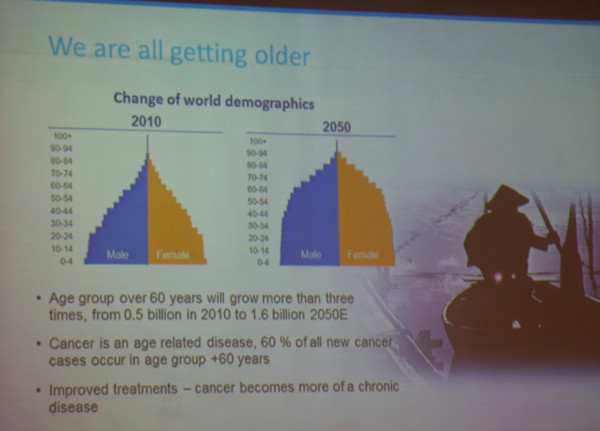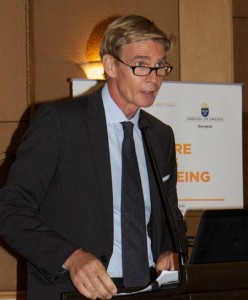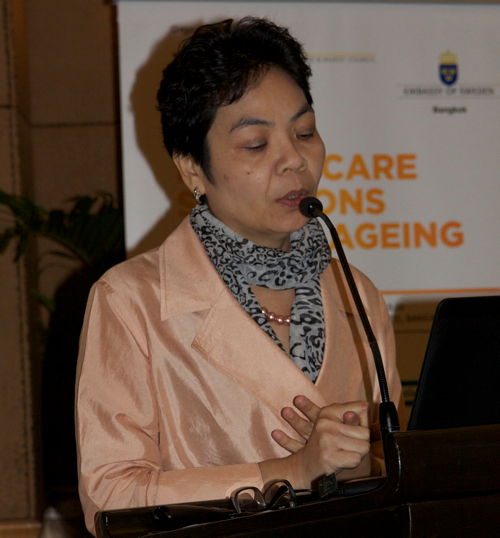With the focus theme ‘Healthcare Solutions For An Ageing Society’ the recent Swedish Healthcare delegation to Thailand and Vietnam was spot on, as Business Sweden’s Ambassador-led delegation met with public and private business representatives in the first country of the visit. A seminar was held in Bangkok on May 25, with Thailand, within the greying of Asia, being a special case with significant challenges ahead.

It’s all in the numbers, as in Credit Suisse’s forecast ‘Thailand’s Ageing society: Economic and Equity implications‘: Indonesia, Malaysia, the Philippines, Singapore and Vietnam all have population growth rates of at least 1 per cent per year between 2010 and 2015, while Thailand’s is only 0.3 per cent. Its total fertility rate of 1.4 children per woman is significantly lower than the Philippines (3.1), Indonesia (2.3) and Malaysia (2.0).
By 2030 Thailand will (contrary to its neighbours in Southeast Asia) officially be an ageing society, with its overall population declining.
Its National Economic and Social Development Board (NESDB) predicts that the number of Thais aged 60 or older will total 20.5 million or nearly one-third of the projected population in 2040 of 63.8 million – lower than the current estimate of around 67 million.
This will, in addition to causing all sorts of challenges for the country’s growth, put tremendous pressure on the country’s healthcare system. Thus this sector actually has very strong growth potential, but not without its challenges.
The Thai government has yet to introduce any serious measurements to address the issue of the growing number of people aged 65 years or more.
Thailand’s number of doctors is below average, hampering the growth of its healthcare industry (despite that its government has been increasing healthcare spending to strengthen the universal coverage scheme.)
 Quality and efficiency
Quality and efficiency
Here, solutions, technologies and philosophies from the Swedish healthcare system can contribute and, as in the words for Swedish Ambassador Klas Molin “…inspire Thailand’s continued progress in developing a health system with quality and efficiency.”
The aim of the Swedish delegation – not the first one within healthcare – was to explore and discuss how Sweden and Thailand could share best practices within healthcare to tackle the issues facing and ageing society.
The ambassador pointed to the success of the Swedish healthcare system resting on a commitment to excellence in R&D and drug discovery, with the highest per capita spending on life science research in Europe.
Mr Peter Naredi, Professor of Surgery at the Sahlgrenska Academy, University of Gothenburg, who where among the speakers, highlighted this focus on quality and efficiency in Swedish healthcare, as he outlined his home country’s case in the topic ‘Healthcare consequences of a fast-ageing population’
In such a situation an increase in cancer incidence is unavoidable, he stated. A national cancer plan is then needed and how to organise the country’s healthcare plays a crucial role. Prevention, early detection, centralization, rehabilitation, survivorship, profession development and R&D are all then matters of importance.
Primary prevention is really important, said the professor. So is detection: if you can find a disease in its early stages.
“If you do not give treatment early the spending will be much higher. And there is better possibility of survival, and also fewer follow-ups.”
He also brought the seminar attendants to the attention how modern technical devices can be cost-effective. For instance high-quality imaging enables optimal diagnostic work and fewer investigations, and doctors can avoid unnecessary treatments.
He said it has become central in Swedish healthcare to decrease inequalities in treatment of cancer; by improving quality of diagnostics and treatments.
In Sweden’s case a fast-aging population and increasing survival in cancer has also lead to a rapid increasing population of cancer survivors. Then the focus lies on quality of life for those people.
The national agreement that improved cancer care is facilitated by research, where the Swedish government and industry collaborates since ten years back.

Cancer top cause of death in Thailand
From the Thailand side Dr Suleeporn Sangrajrang at the Thai National Cancer Institute gave a briefing on the cancer challenges – this form of illness being the top cause of death in Thailand since year 2000.
The main reason for this is the aging population, and also changes in lifestyle, said Dr Suleeporn,
The National Cancer Institute (established in 1968) has 7 centres and 30 regional referral cancer centres.
The estimated incidence of primary liver cancer in Thailand is very high
The main focus is on primary prevention, such as tobacco control, healthy diet, physical activities, reducing alcohol consumption etc.
In addition for example colorectal cancer screening has proven cost-effective. For breast cancer Thailand only has breast cell screening.
The institute focuses on Cancel Control Research and Capacity Building onwards.
Dr Suleeporn welcomed Public Private Partnership (PPP) as a solution.
“This is the way to achieve our goal. We set up our programme to reduce mortality and incidence. But it cannot be achieved only by public sector; it must be a combination with the private.”
“But human resources is the problem in Thailand. Swedish company must support about knowledge and training and education.”
PPP for Universal Health Care
Mr. Eduardo Banzon, Senior Health Expert from the Asian Development Bank (ADB) shared valuable insights into the potential of PPPs within healthcare.
Despite rapid economic growth and social transformation in Asia, countries continue to face challenges in ensuring access to quality health care services for their population. They are, therefore, motivated to explore innovative approaches such as PPPs.
PPPs are innovative, long-term contractual arrangements for developing infrastructure and providing public services by introducing private sector funds and expertise in areas that are normally the responsibility of the government. PPPs, if they are structured and executed appropriately to international ‘best practice’, can help governments face the challenges that they are currently facing in the health sector.
“PPP does not equal privatisation, it means sharing risk and investment, and for the long term,” said Eduardo Banzon. “The public sector is accountable for providing environmental and financial incentives for PPP.”
“PPP can be part of a strategy to move towards Universal Health Care (UHC). UHC mobilizes financing for health services. And with UHC, demand for health services increases. Then the governments are interested in efficient, high quality services.”
“Elements that must be present for a PPP to thrive are: legal, regulatory, readiness, and a comprehensive health plan.”
ADB has and ‘Operation Plan for Health 2015 – 2020’ with a focused approach for addressing the health needs of and supporting ADB developing member countries. This plan leverages loans and grants to achieve Universal Health Coverage through strategic investments in health infrastructure, health sector governance, and health financing.
ADBs wide range of integrated strategies and solutions, including provisions for increasing ADB health sector investments in the Asia and Pacific region from 1% to 2% (2014) of its total portfolio to 3% to 5% by 2020. The plan focuses on health infrastructure, health governance and health financing.
Health financing offers methods for expanding health care though innovative financing that promotes allocation and technical efficiency (including for instance promoting public–private partnerships that lead to larger lending amounts and reduced transaction costs, and cultivating co-financing to develop new business and innovative activities
The Swedish companies Elekta, C-Rad, Arcoma IMIX and Atlas Copco/BeaconMedæs also held presentations at the seminar in Bangkok.
